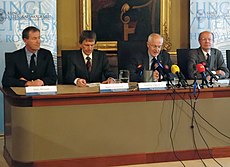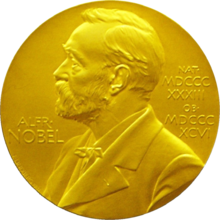| Year
|
|
Laureate
|
Country
|
Rationale
|
| 1969
|

|
റാഗ്നർ ഫ്രിസ്ച്
|
 Norway Norway
|
"for having developed and applied dynamic models for the analysis of economic processes"[3]
|

|
യാൻ ടിൻബർജെൻ
|
 നെതർലന്റ്സ് നെതർലന്റ്സ്
|
| 1970
|

|
പോൾ സാമുവൽസൺ
|
 United States United States
|
"for the scientific work through which he has developed static and dynamic economic theory and actively contributed to raising the level of analysis in economic science"[4]
|
| 1971
|
|
സൈമൺ കുസ്നെറ്റ്സ്
|
 United States United States
|
"for his empirically founded interpretation of economic growth which has led to new and deepened insight into the economic and social structure and process of development"[5]
|
| 1972
|
|
ജോൺ ഹിക്സ്
|
 United Kingdom United Kingdom
|
"for their pioneering contributions to general economic equilibrium theory and welfare theory."[6]
|

|
കെന്നത്ത് ആരോ
|
 United States United States
|
| 1973
|
|
വാസ്സിലി ലിയോൺടിഫ്
|
 Soviet Union Soviet Union
 United States United States
|
"for the development of the input-output method and for its application to important economic problems"[7]
|
| 1974
|

|
ഗുണ്ണർ മിർദാൽ
|
 Sweden Sweden
|
"for their pioneering work in the theory of money and economic fluctuations and for their penetrating analysis of the interdependence of economic, social and institutional phenomena."[8]
|

|
Friedrich Hayek
|
 Austria Austria
 United Kingdom United Kingdom
|
| 1975
|

|
Leonid Kantorovich
|
 Soviet Union Soviet Union
|
"for their contributions to the theory of optimum allocation of resources"[9]
|

|
Tjalling Koopmans
|
 Netherlands Netherlands
 United States United States
|
| 1976
|

|
Milton Friedman
|
 United States United States
|
"for his achievements in the fields of consumption analysis, monetary history and theory and for his demonstration of the complexity of stabilisation policy"[10]
|
| 1977
|

|
Bertil Ohlin
|
 Sweden Sweden
|
"for their pathbreaking contribution to the theory of international trade and international capital movements"[11]
|

|
James Meade
|
 United Kingdom United Kingdom
|
| 1978
|

|
Herbert A. Simon
|
 United States United States
|
"for his pioneering research into the decision-making process within economic organizations"[12]
|
| 1979
|
|
Theodore Schultz
|
 United States United States
|
"for their pioneering research into economic development research with particular consideration of the problems of developing countries."[13]
|
|
|
Arthur Lewis
|
 Saint Lucia Saint Lucia
 United Kingdom United Kingdom
|
| 1980
|
|
Lawrence Klein
|
 United States United States
|
"for the creation of econometric models and the application to the analysis of economic fluctuations and economic policies"[14]
|
| 1981
|

|
James Tobin
|
 United States United States
|
"for his analysis of financial markets and their relations to expenditure decisions, employment, production and prices"[15]
|
| 1982
|
|
George Stigler
|
 United States United States
|
"for his seminal studies of industrial structures, functioning of markets and causes and effects of public regulation"[16]
|
| 1983
|

|
Gérard Debreu
|
 France France
|
"for having incorporated new analytical methods into economic theory and for his rigorous reformulation of the theory of general equilibrium"[17]
|
| 1984
|
|
Richard Stone
|
 United Kingdom United Kingdom
|
"for having made fundamental contributions to the development of systems of national accounts and hence greatly improved the basis for empirical economic analysis"[18]
|
| 1985
|

|
Franco Modigliani
|
 Italy Italy
|
"for his pioneering analyses of saving and of financial markets"[19]
|
| 1986
|

|
James M. Buchanan
|
 United States United States
|
"for his development of the contractual and constitutional bases for the theory of economic and political decision-making"[20]
|
| 1987
|

|
Robert Solow
|
 United States United States
|
"for his contributions to the theory of economic growth"[21]
|
| 1988
|

|
Maurice Allais
|
 France France
|
"for his pioneering contributions to the theory of markets and efficient utilization of resources"[22]
|
| 1989
|

|
Trygve Haavelmo
|
 Norway Norway
|
"for his clarification of the probability theory foundations of econometrics and his analyses of simultaneous economic structures"[23]
|
| 1990
|
|
Harry Markowitz
|
 United States United States
|
"for their pioneering work in the theory of financial economics"[24]
|
|
|
Merton Miller
|

|
William F. Sharpe
|
| 1991
|

|
Ronald Coase
|
 United Kingdom United Kingdom
|
"for his discovery and clarification of the significance of transaction costs and property rights for the institutional structure and functioning of the economy"[25]
|
| 1992
|

|
Gary Becker
|
 United States United States
|
"for having extended the domain of microeconomic analysis to a wide range of human behaviour and interaction, including non-market behaviour"[26]
|
| 1993
|

|
Robert Fogel
|
 United States United States
|
"for having renewed research in economic history by applying economic theory and quantitative methods in order to explain economic and institutional change"[27]
|

|
Douglass North
|
| 1994
|
|
John Harsanyi
|
 United States United States
|
"for their pioneering analysis of equilibria in the theory of non-cooperative games."[28]
|

|
John Forbes Nash
|

|
Reinhard Selten
|
 Germany Germany
|
| 1995
|
|
Robert Lucas, Jr.
|
 United States United States
|
"for having developed and applied the hypothesis of rational expectations, and thereby having transformed macroeconomic analysis and deepened our understanding of economic policy"[29]
|
| 1996
|
|
James Mirrlees
|
 United Kingdom United Kingdom
|
"for their fundamental contributions to the economic theory of incentives under asymmetric information"[30]
|
|
|
William Vickrey
|
 Canada Canada
 United States United States
|
| 1997
|

|
Robert C. Merton
|
 United States United States
|
"for a new method to determine the value of derivatives."[31]
|

|
Myron Scholes
|
 Canada Canada
 United States United States
|
| 1998
|

|
Amartya Sen
|
 India India
|
"for his contributions to welfare economics"[32]
|
| 1999
|

|
Robert Mundell
|
 Canada Canada
|
"for his analysis of monetary and fiscal policy under different exchange rate regimes and his analysis of optimum currency areas"[33]
|
| 2000
|

|
James Heckman
|
 United States United States
|
"for his development of theory and methods for analyzing selective samples"[34]
|
|
|
Daniel McFadden
|
 United States United States
|
"for his development of theory and methods for analyzing discrete choice"[34]
|
| 2001
|

|
George Akerlof
|
 United States United States
|
"for their analyses of markets with asymmetric information"[35]
|

|
Michael Spence
|

|
Joseph E. Stiglitz
|
| 2002
|

|
Daniel Kahneman
|
 Israel Israel
 United States United States
|
"for having integrated insights from psychological research into economic science, especially concerning human judgment and decision-making under uncertainty"[36]
|

|
Vernon L. Smith
|
 United States United States
|
"for having established laboratory experiments as a tool in empirical economic analysis, especially in the study of alternative market mechanisms"[36]
|
| 2003
|

|
Robert F. Engle
|
 United States United States
|
"for methods of analyzing economic time series with time-varying volatility (ARCH)"[37]
|

|
Clive Granger
|
 United Kingdom United Kingdom
|
"for methods of analyzing economic time series with common trends (cointegration)"[37]
|
| 2004
|

|
Finn E. Kydland
|
 Norway Norway
|
"for their contributions to dynamic macroeconomics: the time consistency of economic policy and the driving forces behind business cycles."[38]
|

|
Edward C. Prescott
|
 United States United States
|
| 2005
|

|
Robert J. Aumann
|
 United States United States
 Israel Israel
|
"for having enhanced our understanding of conflict and cooperation through game-theory analysis."[39]
|

|
Thomas C. Schelling
|
 United States United States
|
| 2006
|

|
Edmund S. Phelps
|
 United States United States
|
"for his analysis of intertemporal tradeoffs in macroeconomic policy"[40]
|
| 2007
|

|
Leonid Hurwicz
|
 Poland Poland
 United States United States
|
"for having laid the foundations of mechanism design theory"[41]
|

|
Eric S. Maskin
|
 United States United States
|

|
Roger B. Myerson
|
| 2008
|

|
Paul Krugman
|
 United States United States
|
"for his analysis of trade patterns and location of economic activity"[42]
|
| 2009
|

|
Elinor Ostrom
|
 United States United States
|
"for her analysis of economic governance, especially the commons"[43]
|

|
Oliver E. Williamson
|
"for his analysis of economic governance, especially the boundaries of the firm"[43]
|
| 2010
|

|
Peter A. Diamond
|
 United States United States
|
"for their analysis of markets with search frictions"[44]
|

|
Dale T. Mortensen
|

|
Christopher A. Pissarides
|
 Cyprus Cyprus
|
| 2011
|

|
Thomas J. Sargent
|
 United States United States
|
"for their empirical research on cause and effect in the macroeconomy"[45]
|

|
Christopher A. Sims
|
| 2012
|

|
Alvin E. Roth
|
 United States United States
|
"for the theory of stable allocations and the practice of market design."[46]
|

|
Lloyd S. Shapley
|
| 2013
|

|
Eugene F. Fama
|
 United States United States
|
"for their empirical analysis of asset prices."[47]
|

|
Lars Peter Hansen
|

|
Robert J. Shiller
|
| 2014
|

|
Jean Tirole
|
 France France
|
"for his analysis of market power and regulation".[48]
|
| 2015
|

|
Angus Deaton
|
 United Kingdom United Kingdom
 United States United States
|
"for his analysis of consumption, poverty, and welfare".[49]
|
| 2016
|
|
ഒലിവർ ഹാർട്
|
 United States United States
|
കരാർ സിദ്ധാന്തിന് നല്കിയ സംഭാവനകൾക്ക്[50]
|

|
ബെങ്റ്റ് ഹോംസ്ട്രോം
|
 ഫിൻലാന്റ് ഫിൻലാന്റ്
|






























































